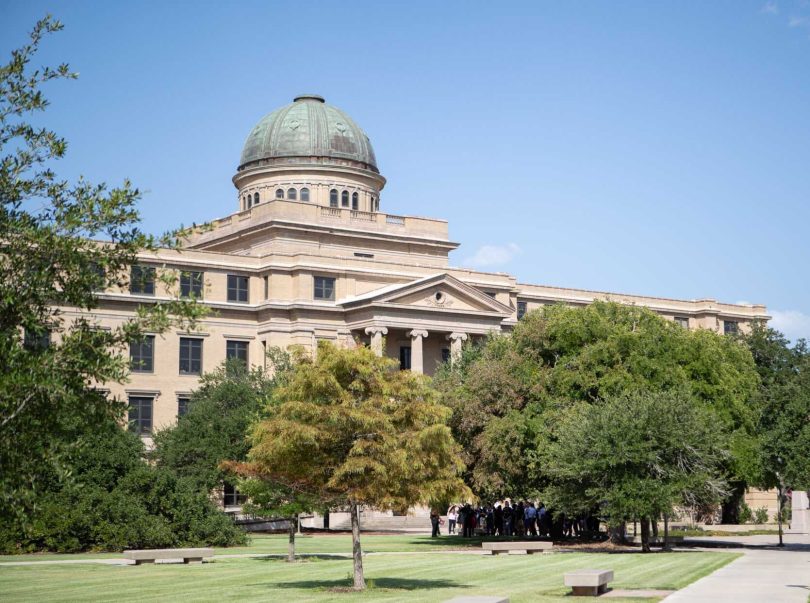According to a review by The Battalion, dozens of minors and certificates have had requests for inactivation submitted in the Curricular Approval Request System, or CARS. The requests from the Office of the Provost come after new requirements — developed after June 2023 inquiries into the LGBTQ studies minor — dictate programs will be inactivated if they do not meet a certain enrollment threshold.
Submitting the inactivation request in CARS is the first step in the process and must occur before other review bodies can approve or deny it. According to Texas A&M’s Standard Administrative Procedure, the request is then routed to the appropriate department and college before it reaches Curricular Services and Provost and Executive Vice President Alan Sams, who is spearheading the current proposal to inactivate 52 minors and certificates. As provost, Sams is the No. 2 in the university that makes some of the largest decisions impacting A&M. The Texas Higher Education Coordinating Board does not mandate the new thresholds.
Once approved, the proposal requires review by the Undergraduate Curriculum Committee — or Graduate Council if it is a graduate program — and the Faculty Senate before it reaches President Mark A. Welsh III. Multiple faculty members have alleged the inactivations violate shared governance, the concept that faculty have a strong say in the university’s proceedings. Before these inactivations, established norms dictated inactivations were proposed solely by faculty members in departments and programs.
According to a Sept. 23 statement provided by an A&M spokesperson, the Office of the Provost seeks to inactivate 38 certificates and 14 minors due to low enrollment. The new thresholds for minors and undergraduate certificates require 10 graduates in the last two years or a minimum current-year enrollment of five students. Graduate certificates must have six graduates in two years or a minimum enrollment of three students.
As of publication, CARS shows most programs have submitted inactivation requests, with multiple at different stages of the process. Documents previously reviewed by The Battalion show the Office of the Provost required programs to be entered into CARS by Friday, Sept. 20.
A Sept. 24 statement said the full list of impacted programs will not become public until it goes before the Faculty Senate “to allow for the appropriate discussion and decision-making” and to “allow faculty, deans, department heads and the curricular committees to have their review.”
Multiple faculty members have protested the decision in various ways, some through votes. Faculty from the Department of Geology and Geophysics voted to keep the environmental and engineering certificate with 87.5% in favor. On Wednesday, 30 faculty from the Women and Gender Studies Program unanimously voted that they “do not support the inactivation of the WGST minor.”
“This was a huge turnout and really shows how strongly the WGST faculty support the LGBTQ minor,” Theresa Morris, the WGST program director, said.
According to CARS and other documentation reviewed by The Battalion, the following minors, listed alphabetically, have been scheduled for inactivation by the provost.
Editor’s note: These are incomplete and unofficial lists.
Analysis, Design and Management of Energy Conversion Systems
Asian Studies
Control of Mechanical Systems
Design and Simulation of Mechanical Systems
Geophysics
Global Art Design and Construction
Global Culture and Society
Global Health
Lesbian, Gay, Bisexual, Transgender, and Queer, or LGBTQ, Studies
Natural Gas Production and Processing
Petroleum Engineering
The following certificates, listed alphabetically, are scheduled for inactivation by the provost.
Banking Services
Business Economics
Capital Markets and Investments
Communication and Global Media
Communication, Diversity and Social Justice
Computational Science
Cultural Competency
Diversity
Energy Engineering
Energy Technology, Law and Policy
Engineering Therapeutics Manufacturing
Environmental and Engineering Geology
Geoscience Data Management
Health Systems Management
International Business
International Petroleum Management
Investment Banking
Landscape Management
Performing Social Activism
Petroleum Geoscience
Popular Culture
Quantitative Economic Methods
Regulatory Science in Food Systems
Transportation Planning
Subsea Engineering
Watershed
At least two certificates were already set for inactivation by faculty before the provost’s order: communication and global media and communication, diversity and social justice. According to documents reviewed by The Battalion, the provost overruled at least 12 appeals made by colleges to save certain minors and certificates.
An A&M spokesperson said the thresholds now being used to inactivate 52 of A&M’s total 320 minors and certificates began development last year.
“In June 2023, inquiries around the LGBTQ minor that had only a few enrolled students prompted the university to examine its programs and identify 70 certificates and minors that had no or very few graduates or enrollees,” the statement reads.
The spokesperson did not expand on the exact inquiries. However, an article from conservative outlet Texas Scorecard published on June 27, 2023, claimed “taxpayer-funded colleges are promoting LGBT ideologies.” Scorecard is published by “hardline conservative activist” Michael Quinn Sullivan, A&M Class of 1992, and chaired by Tim Dunn, one of the largest Republican donors in Texas.
The inquiries mentioned in the statement led to the provost’s office partnering with the Council of Deans to set the thresholds for “low-producing” programs, which was charged to a subcommittee headed by Debbie Thomas, associate provost and the dean of the College of Marine Sciences and Maritime Studies in Galveston.
Sams shared a comment with The Battalion on Sept. 30 further explaining the inactivations.
“This entire effort stems from the fact we created and are currently maintaining programs for which there is little to no demand,” Sams said. “Faculty engagement is built into the full review process for creation, changes and inactivation, which all of these minors and certificates will move through in the coming weeks. This full review process is a key element of shared governance. As we move forward, we are committed to developing and maintaining credentials of value to our students, and establishing and enforcing thresholds for low-producing minors and certificates is one step in that process.”
A spokesperson said all enrolled students can complete the programs, and the associated courses will stay intact. According to a statement, on average, there is less than one student enrolled per certificate and 1.2 per minor. The Office of the Provost is likely not calculating the fall of 2024 in its calculations, according to an email from Timothy C. Powers, chief of staff to the provost, that was obtained by The Battalion. When discussing a program approved in the fall of 2022, Powers shared statistics suggesting the provost only considered the following when determining threshold complicity:
Graduates in 2021-22 academic year
Graduates in 2022-23 academic year
Students enrolled in the last two years
Students enrolled in the fall of 2023 and spring of 2024
As such, newer programs — such as the environmental and engineering geology minor — are being inactivated despite claiming to have 33 fall 2024 enrollments, well above the five-student requirement. Similarly, the landscape management certificate is getting inactivated despite 10 student enrollments. An A&M spokesperson said on Wednesday evening they are verifying information and plan to share details on Thursday.
The University Curriculum Committee, the next step in the inactivation process for multiple programs, is set to meet on Friday. It’s unclear if it will vote on inactivations, but a committee member said the group will discuss the proposal.
A&M’s Faculty Senate is set to meet on Oct. 14 in Rudder Tower. As of publication, neither the UCC agenda nor the Faculty Senate agenda has been updated to include votes on inactivations.







